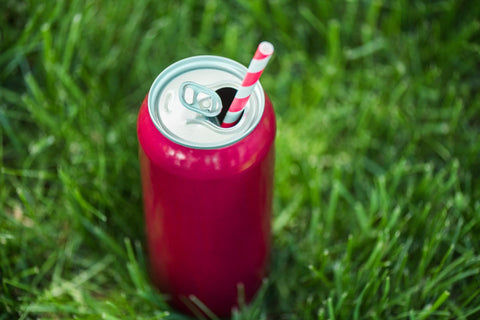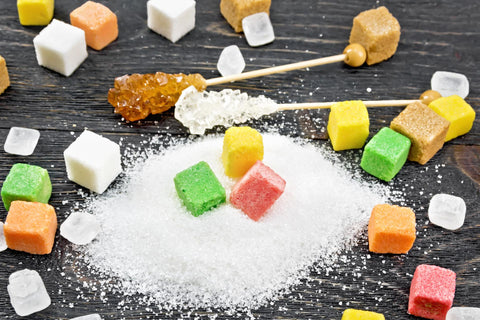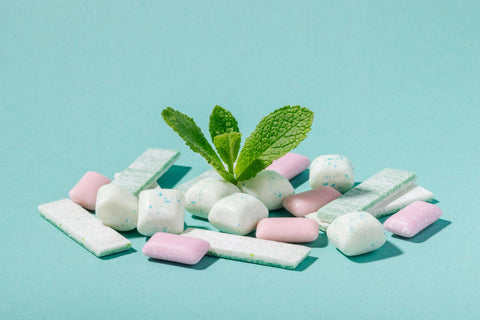Is Sucralose Bad For You? Sifting Through the Sweet and the Bitter Truth
It's a worthwhile question: is sucralose bad for you? In the world of dietary choices and health, few topics generate as much discussion as that of artificial sweeteners and, more specifically, sucralose. Known widely by its commercial name Splenda, sucralose has become a staple in many 'diet' foods and commercial products marketed as a zero-calorie sweetener. However, emerging research recognises that sucralose is not an inert substance and may cause long-term metabolic issues. So, to find an answer to the question: is sucralose bad for you? We explain what sucralose is, explore common health concerns, and sift through the latest findings to shed light on this sweet topic. Let's get started.
The Lowdown on Artificial Sweeteners
Artificial sweeteners are a category of zero-calorie (non-nutritive) sugar substitutes found in several commercial food products, such as soft drinks, energy drinks and confectionery. Their consumption has witnessed a notable rise over the last few years. While many food regulatory bodies consider artificial sweeteners to be generally safe, concerns have emerged regarding the long-term safety of specific sweeteners.
Are Artificial Sweeteners Harmful For Your Health?
So, are artificial sweeteners bad for you? The truth is, it's not that cut and dry. In my view, you should avoid some artificial sweeteners, while others are probably fine to consume. The Food Standards Australia and New Zealand authority have given their stamp of approval to artificial sweeteners as being safe for consumption. However, research over the last decade begs to differ.
Artificial sweeteners may indeed have no calories, but their effects on long-term health have stirred considerable debate. This is why it’s crucial for you as a consumer to remain informed and to recognise the risks (or benefits) of consuming sugar substitutes in an otherwise healthy diet. Ideally, the best way to get around all this confusion is to choose foods with easily recognisable ingredients in their natural form.
Why Are Artificial Sweeteners So Popular?
Artificial sweeteners have surged in popularity due to the growing awareness of the health risks associated with excess sugar consumption. This trend has been fuelled by the rise of lifestyle diseases such as obesity and diabetes, leading consumers to seek sugar-free alternatives that allow the enjoyment of sweet flavours without the sugar overload.
As the food industry responded with many 'sugar-free' or 'diet' options, artificial sweeteners have become ubiquitous in grocery aisles, enabling people to indulge in their favourite sweet treats, seemingly without ill-health consequences.
However, as we’ll discover, these chemical sweeteners actually do the opposite of what they're designed to do. While they have a zero-calorie profile, when consumed, their reaction in the body is inflammatory, cytotoxic and metabolically disruptive on many levels.
Before looking at the health research related to sucralose, let’s outline some of the commonly found artificial sweeteners in many commercial food products.
Common Artificial Sweeteners and Their Chemical Numbers
Have you ever been to the supermarket, purchased a bag of chips, lollies or any other packaged food item and flipped it over to read the ingredients list? Chances are you'll see some chemicals, additives and preservatives.
Sometimes, those ingredients are simply the botanical name for a natural ingredient. Other times, it can be a veritable chemical cocktail, most of which isn't actually food at all. Understanding what's in the food you're eating is an essential skill for making healthy choices with food.
Here's a list of the most common artificial sweeteners used in junk food, sweet drinks (and even some 'diet' foods) that you should note.
Artificial Sweeteners
- Sucralose (955): Commonly known as Splenda, it is a very sweet, non-nutritive chemical sweetener found in many food products. Splenda is synthetically created by chlorinating sucrose (table sugar), which changes the chemical structure and makes it much sweeter than sugar.
- Acesulfame Potassium (950): Marketed under the brand name Sunett, this chemical sweetener is often used in combination with other artificial sweeteners to enhance their taste. It has been linked to health concerns such as digestive issues and disrupted gut flora.
- Aspartame: (951): Marketed under brand names such as NutraSweet and Equal, Aspartame is another popular artificial sweetener. It is made from two amino acids, aspartic acid and phenylalanine, and has been linked to various health issues, including increased cancer risk and digestive problems.
- Saccharin (954): This artificial sweetener was discovered in the late 1800s and is known for its intense sweetness. It's also known as Sweet'N Low and is commonly used in soft drinks and other processed foods. However, it has been linked to potential health risks, such as an increased risk of bladder cancer.
- Neotame (961): This artificial sweetener is marketed under the brand name Newtame and is similar in structure to Aspartame. It is 8000 times sweeter than sucrose and is often found in bubble game and drink powders. While it is claimed to be safe, some concerns have been raised about its potential effects on the gut microbiome.
Naturally-Derived Artificial Sweeteners
- Steviol Glycosides (960): Also known as Stevia, Truvia or PureVia. These come from the leaves of the stevia plant and are used as a sweetener and sugar substitute.
- Monk Fruit Extract (967): Also known as Luo Han Guo, this sweetening agent is extracted from monk fruit and is about 300 times sweeter than sugar. It is commonly used in sugar-free products and health foods.
What is Sucralose?
Before we tackle the health outcomes, it's essential to understand what sucralose is. Sucralose is an artificial sweetener derived from sugar through a chemical process that replaces three hydrogen-oxygen groups on the sugar molecule with chlorine atoms. The result is a sweetener that is around 600 times sweeter than sugar but with none of the caloric content that sugar carries. This is largely what’s made it popular among people monitoring their calorie intake or managing diabetes.
Is Sucralose Bad for You?
If you're wondering whether or not sucralose is bad for you, you're not alone. Many people share this concern about whether or not sucralose has harmful health effects. So, what are the overall health impacts of sucralose?
In short, sucralose isn't that great for your health. Despite being approved by numerous food regulatory authorities, the safety of sucralose is still a topic of debate. Some researchers claim that sucralose can have potential adverse effects on the body, ranging from digestive issues to negative impacts on gut bacteria and insulin responses.
Here are a few studies that demonstrate such findings.
Sucralose Impairs Heart Health
A 2021 study published in the journal Advances in Nutrition highlights some new evidence indicating that sucralose is associated with a higher cardiovascular mortality rate, particularly among individuals who are overweight and obese. The combined impact on the digestive tract and insulin function also negatively affects heart health.
Sucralose Disrupts Microbiome Health
Another key piece of research, a 2022 clinical trial, examined the impact of sucralose on different health outcomes in a group of healthy young adults. In this study, participants consumed either sucralose or water for ten weeks. Throughout and at the end of the study, participants had their blood glucose and insulin levels monitored. Conclusively, sucralose disrupts certain gut bacteria, which is known as dysbiosis. The authors deemed long-term sucralose intake as harming gut health and metabolism.
Sucralose Causes Metabolic Changes To Glucose Control
A further study published in Frontiers in endocrinology demonstrated that sucralose alters the expression of genes that govern glucose control and causes localised cell toxicity in the hypothalamus. In other words, chronic consumption of sucralose actually impairs brain cell growth. It also contributes to genetic disruptions that lead to a higher obesity and diabetes risk later in life.
Sucralose Interacts With Certain Medications
According to a study published in the Journal of Toxicology and Environmental Health, sucralose upregulates the expression of liver enzymes that control drug metabolism. This means that consuming sucralose or Splenda may impact the effectiveness of some medications. These include statins (cholesterol medications), immunosuppressants, some antipsychotics, and antibiotics like erythromycin. Care should also be taken when consuming sucralose if taking opioid pain medications, some antidepressants, and beta-blockers (heart medications). If you're ever in doubt, it's best to consult with your doctor or a trusted healthcare professional for further advice.
Sucralose May Benefit Autoimmune Conditions
Despite the concerning evidence, there’s a skerrick of good news for sucralose. A study published in Nature in 2023 found that high doses of sucralose might have immunomodulatory effects in mice. This can potentially reduce the impact of autoimmunity, infection, and certain cancers. According to the study, sucralose appears to impact the rate of T-cell proliferation and differentiation. This is a somewhat unexpected finding as it provides evidence for a possible beneficial role for high-dose sucralose, at least in mice, with the mitigation of some instances of chronic autoimmune diseases. While these findings are preliminary and conducted in animals, they present a fascinating counterargument to the debate, suggesting potential benefits in specific scenarios.

Balancing the Sweet with the Bitter
The existing body of research about sucralose presents a complex picture. On one hand, there are clear indications that sucralose could adversely affect cardiovascular health, glucose metabolism, and gut microbiome balance. If you care about long-term good health, these are significant considerations. Especially if you have pre-existing health conditions, are struggling with extra weight or if you have other metabolic concerns such as insulin resistance or diabetes.
On the other hand, emerging research suggests sucralose affects the immune system, which could be helpful in some unique scenarios. However, it's crucial to note that most people do not consume sucralose in the high doses used in some of the animal studies from which these results were discovered. Therefore, translating these findings to humans is not a realistic endpoint, so further research on sucralose consumption is undoubtedly needed.
Natural Alternatives to Sugar
If you want to dodge the entire artificial sweetener debacle, don’t forget about some healthier sweet options.
- Honey: A natural sweetener we all know and love with a range of health benefits, often used in beverages, baking, tea and as a spread.
- Maple Syrup: Sourced from the sap of maple trees and popular for its distinctive flavour, used in baking and as a sweet topping.
- Agave Nectar: Extracted from the blue agave plant, it is sweeter than sugar and commonly found in beverages.
- Coconut Sugar: Made from the sap of the coconut palm, it contains trace amounts of minerals and is utilised as a granulated sugar substitute.
- Molasses: A byproduct of sugar production, rich in minerals, and typically used in baked desserts and biscuits for its robust flavour.
Is It All or Nothing When It Comes To Sucralose?
So is sucralose bad for you? You may need to decide for yourself. Given the evidence, minimal or no sucralose consumption is important in maintaining your overall health. In this instance, natural sugar is superior, with fewer detrimental effects than its artificial counterparts. But for optimal health, enjoying a variety of whole, natural foods just as Mother Nature intended is the best way forward.
It is also essential to prioritise a balanced diet to help you meet your macronutrient goals and ensure you get enough protein, carbohydrates and fats from natural and unprocessed food sources. It helps to stay informed about the new research on sucralose and other artificial sweeteners. If you need more help, consider consulting a nutritionist or healthcare provider to understand better how these substitutes may impact your health.
Keep It Natural For Overall Better Health
Ultimately, while sucralose offers benefits such as calorie control and sweetness without the sugar rush, its potential health impacts cannot be ignored. More comprehensive and long-term human studies are necessary to fully understand sucralose's effects and to provide clearer guidelines for its safe consumption. In the meantime, however, better sugar alternatives are available that don't disrupt your body and your health. Weighing up the sweet benefits against the possible bitter consequences is a personal decision that should be made with the best available information and, when possible, professional advice.
Article References
Abou-Donia, M. B., El-Masry, E. M., Abdel-Rahman, A. A., McLendon, R. E., & Schiffman, S. S. (2008). Splenda alters gut microflora and increases intestinal p-glycoprotein and cytochrome p-450 in male rats. Journal of toxicology and environmental health. Part A, 71(21), 1415–1429. https://doi.org/10.1080/15287390802328630
Ahmad, S. Y., Friel, J., & Mackay, D. (2020). The Effects of Non-Nutritive Artificial Sweeteners, Aspartame and Sucralose, on the Gut Microbiome in Healthy Adults: Secondary Outcomes of a Randomized Double-Blinded Crossover Clinical Trial. Nutrients, 12(11), 3408. https://doi.org/10.3390/nu12113408
Ahmad, S. Y., Friel, J. K., & Mackay, D. S. (2020). Effect of sucralose and aspartame on glucose metabolism and gut hormones. Nutrition reviews, 78(9), 725–746. https://doi.org/10.1093/nutrit/nuz099
AlDeeb, O. A., Mahgoub, H., & Foda, N. H. (2013). Sucralose. Profiles of drug substances, excipients, and related methodology, 38, 423–462. https://doi.org/10.1016/B978-0-12-407691-4.00010-1
Del Pozo, S., Gómez-Martínez, S., Díaz, L. E., Nova, E., Urrialde, R., & Marcos, A. (2022). Potential Effects of Sucralose and Saccharin on Gut Microbiota: A Review. Nutrients, 14(8), 1682. https://doi.org/10.3390/nu14081682
Food Standards Australia New Zealand, Additives, Sweeteners, https://www.foodstandards.gov.au/consumer/additives/Sweeteners, viewed 19 Feb 2024
Méndez-García, L. A., Bueno-Hernández, N., Cid-Soto, M. A., De León, K. L., Mendoza-Martínez, V. M., Espinosa-Flores, A. J., Carrero-Aguirre, M., Esquivel-Velázquez, M., León-Hernández, M., Viurcos-Sanabria, R., Ruíz-Barranco, A., Cota-Arce, J. M., Álvarez-Lee, A., De León-Nava, M. A., Meléndez, G., & Escobedo, G. (2022). Ten-Week Sucralose Consumption Induces Gut Dysbiosis and Altered Glucose and Insulin Levels in Healthy Young Adults. Microorganisms, 10(2), 434. https://doi.org/10.3390/microorganisms10020434
Park, S., Sethi, S., & Bouret, S. G. (2019). Non-nutritive Sweeteners Induce Hypothalamic ER Stress Causing Abnormal Axon Outgrowth. Frontiers in endocrinology, 10, 876. https://doi.org/10.3389/fendo.2019.00876
Risdon, S., Battault, S., Romo-Romo, A., Roustit, M., Briand, L., Meyer, G., Almeda-Valdes, P., & Walther, G. (2021). Sucralose and Cardiometabolic Health: Current Understanding from Receptors to Clinical Investigations. Advances in nutrition (Bethesda, Md.), 12(4), 1500–1513. https://doi.org/10.1093/advances/nmaa185
Thomson, P., Santibañez, R., Aguirre, C., Galgani, J. E., & Garrido, D. (2019). Short-term impact of sucralose consumption on the metabolic response and gut microbiome of healthy adults. The British journal of nutrition, 122(8), 856–862. https://doi.org/10.1017/S0007114519001570
Wikipedia Contributors, (2024, February 19). Sucralose. Retrieved from Wikipedia website: https://en.wikipedia.org/wiki/Sucralose, viewed 19 February 2024
Zani, F., Blagih, J., Gruber, T., Buck, M. D., Jones, N., Hennequart, M., Newell, C. L., Pilley, S. E., Soro-Barrio, P., Kelly, G., Legrave, N. M., Cheung, E. C., Gilmore, I. S., Gould, A. P., Garcia-Caceres, C., & Vousden, K. H. (2023). The dietary sweetener sucralose is a negative modulator of T cell-mediated responses. Nature, 615(7953), 705–711. https://doi.org/10.1038/s41586-023-05801-6



